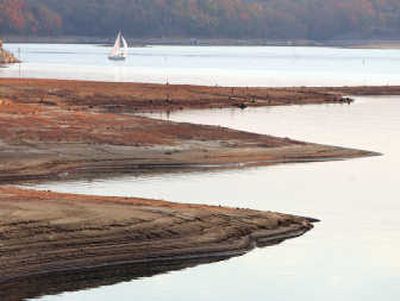Governor, clergy to pray for rain at Georgia Capitol

ATLANTA – As Georgia descends deeper into drought, Gov. Sonny Perdue has ordered water restrictions, launched a legal battle and asked President Bush for help. Today, the governor will call on a higher power.
He will join lawmakers and ministers on the steps of the state Capitol to pray for rain.
While public prayer vigils might raise eyebrows in other parts of the nation, they are mostly shrugged off in the Bible Belt, where turning to the heavens for help is common and sometimes even politically expedient.
“Christianity has more of a place in the culture here than in some other region,” said Ray Van Neste, a professor of Christian studies at Union University in Jackson, Tenn. “And it’s only natural, in a way, for the public to pray for rain.”
Perdue won’t be the first governor to hold a call for public prayer during the epic drought gripping the Southeast. Alabama Gov. Bob Riley issued a proclamation declaring a week in July as “Days of Prayer for Rain” to “humbly ask for His blessings and to hold us steady in times of difficulty.”
The loudest opposition to Perdue’s move has come from the Atlanta Freethought Society, a secular group that is expecting about a dozen of its 125 members to protest at the vigil.
“The governor can pray when he wants to,” said Ed Buckner, who is organizing the protest. “What he can’t do is lead prayers in the name of the people of Georgia.”
Political heavyweights outside the U.S. are known to occasionally plead to the heavens for rain. In May, Australian Prime Minister John Howard asked churchgoers to pray for rain in hopes of snapping a drought that has devastated crops and bankrupted farmers Down Under.
In the U.S., public expressions of faith are often discouraged as a breach of the separation of church and state.
Thomas Jefferson, for one, resisted calls for a federal day of prayer. But he was an exception. From George Washington, who declared “a day of prayer and thanksgiving,” to Harry Truman, who established a National Day of Prayer, American politicians have not been shy about associating themselves with petitions to the Almighty.